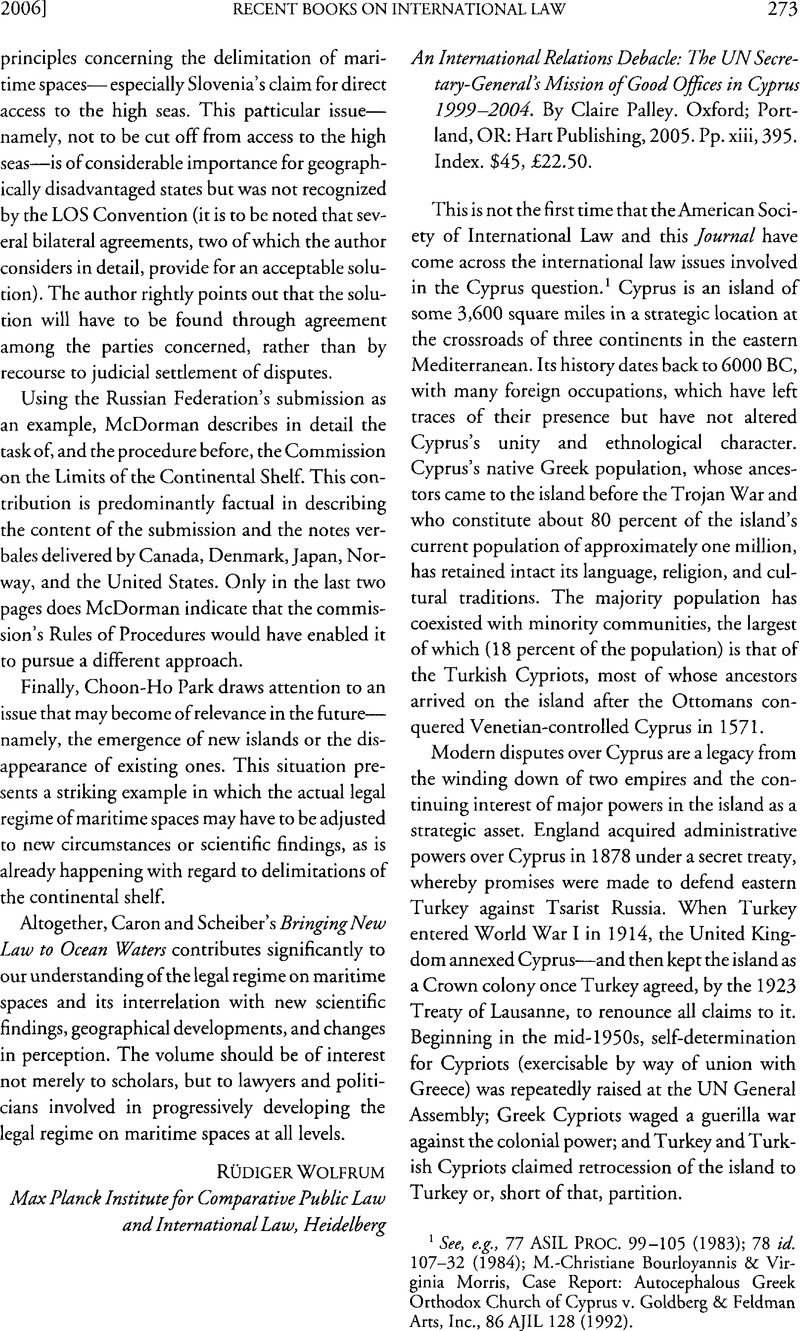Article contents
An International Relations Debacle: The UN Secretary-General’s Mission of Good Offices in Cyprus 1999-2004. By Claire Palley. Oxford; Portland, OR: Hart Publishing, 2005. Pp. xiii, 395. Index. $45, £22.50.
Published online by Cambridge University Press: 27 February 2017
Abstract

- Type
- Recent Books on International Law
- Information
- Copyright
- Copyright © American Society of International Law 2006
References
1 See, e.g., 77 ASIL Proc. 99–105 (1983)Google Scholar; 78 id. 107-32 (1984); M.-Christiane, Bourloyannis & Morris, Virginia Case Report: Autocephalous Greek Orthodox Church of Cyprus v. Goldberg & Feldman Arts, Inc., 86 AJIL 128 (1992)Google Scholar.
2 The ASIL, in collaboration with Oxford University Press, published a monograph that considered, in relation to the Cyprus situation, the role of international law in governmental decision making: Thomas Ehrlich, Cyprus, 1958-1967 (1974). A fuller picture is given in James, Alan Keeping the Peace in the Cyprus Crisis of 1963-1964 (2002)Google Scholar, which is based on now-open U.S. and UK documents. The studies by Robert Holland, Britain and the Revolt in Cyprus, 1954-1959 (1998) and Stephen George Xydis, Cyprus: Conflict and Conciliation, 1954-1958 (1967)—using public and private documents— reveal the international dynamics at work in the period just prior to Cyprus’s independence.
3 In The Cyprus Conspiracy: America, Espionage and the Turkish Invasion (1999), based on U.S. archives, Brendan O’Malley and Ian Craig substantiate the account given by Lawrence Stern in The Wrong Horse: The Politics of Intervention and the Failure of American Diplomacy (1977).
4 See Report of the Secretary-General on His Mission of Good Offices in Cyprus, UN Doc. S/2003/398 (2003).
5 The application of the EU acquis communautaire to the Turkish-occupied area (“those areas of the Republic of Cyprus in which the Government of the Republic of Cyprus does not exercise effective control”) was temporarily suspended by Protocol No. 10 of the Act of Accession of the Republic of Cyprus (2003 O.J. (L 236) 955), and special arrangements were made under Council Regulation (EC) 866/2004 (2004 O.J. (L 161) 128), known as the “Green Line” regulation. Moreover, arrangements between the EU, the United Kingdom, and Cyprus were made concerning the UK Sovereign Base Areas by Protocol No. 3 of the Act of Accession, which left those areas outside the EU but provided that parts of the aquis (specifically regarding customs, agriculture, and taxation) would apply to them.
6 See Haass, Richard Conflicts Unending: The United States and Regional Disputes (1990)Google Scholar.
7 For example, the Turkish Cypriot-controlled unit would be reduced to “29 percent plus” of the territory of the federation, and the presidency would have not have to rotate between the communities.
- 1
- Cited by




